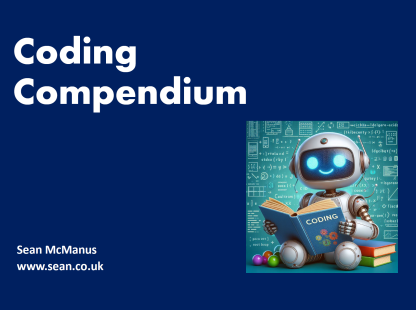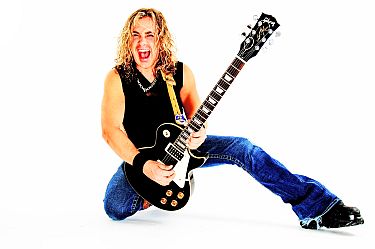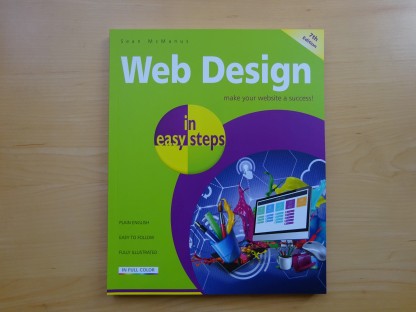
Coding Compendium
A free 100-page ebook collecting my projects and tutorials for Raspberry Pi, micro:bit, Scratch and Python. Simply join my newsletter to download it.
An edited and shorter version of this article appeared in Musician Magazine, the magazine of the Musicians Union. March 2010.
You don't need a record label to sell your music any more. If you know how, you can easily get your music stocked in iTunes and Amazon, as Sean McManus reveals.
Ten years ago, nobody would have thought a computer company from California would be the dominant force in the UK music industry. Few would even have bet that it would become the most important company called Apple in the industry. Today, Apple's iTunes store is responsible for most legal downloads, with Amazon aggressively gnawing away at its market share, and a whole host of other digital retailers jostling for third place. It's a big and growing market. Last year, sales of digital albums grew by 56% and paid downloads made up 98% of the singles market.
For artists on major label contracts, the rise of digital could be frustrating. "An artist with a major label deal gets on average only 5p from an iTunes sale in the UK," says Horace Trubridge, assistant general secretary, the Musicians' Union. "This is because record companies apply their outdated royalty calculations to digital royalties. For a 79p iTunes download, the record company pays the artist the same percentage royalty as it would have if it had incurred all the costs of manufacturing a CD, hiring a van to ship it out in and putting it in a record shop somewhere in the UK. In some cases the credit card company is making more money from a digital sale than the artist. It's little wonder that some artists have said they might as well give it away for free."
Or go it alone, perhaps? Because many artists are finding that they can get their music stocked in iTunes, Amazon and a host of other services, without the support of a record label. As a result, they can keep a much bigger piece of the pie. iTunes will pay a record company about 43p of the 79p. Artists who cut out the record company can keep most of that.
iTunes and Amazon aren't interested in dealing with artists directly, but a rich ecosystem of intermediaries has sprung up. They typically provide a one-stop shop, so you can upload your music to one place and have it ripple out through all major stores, and sometimes over a hundred minor ones too.
Some of these intermediaries are selective of who they work with. DashGo is one service Amazon recommends as a way for independent artists to get into its MP3 catalogue. Ben Patterson, president, says: "For independent artists, besides great music, I'm always excited by bands that are risk-takers and self-motivated. I learned a long time ago while working at a management company that an artist has to be their own biggest fan and advocate. Nobody should want it more, and if they do, then any success is bound to be fleeting. So when I see an act that has taken real steps beyond recording the album to start to connect to fans and build an audience, that is a great indicator. Typically I pass on music that DashGo can't add value to in a meaningful way."
Most other providers are open to all-comers. "An artist has no requirements to jump through for us," says Peter Wells, co-founder of TuneCore. "Who are we to say what's good music, what will sell, what is worth being in the world? So all we ask is that our artists avoid all samples they don't have the rights for, and that they do have the right to sell all the material they put up through us."

Paul Hurst, lead guitarist with The Jokers, says digital distribution is the future.
Independent band The Jokers has sold 5,000 downloads through TuneCore, as well as 2,000 CDs distributed by Cargo. "The internet allows anyone and everyone to distribute their music without having to rely on majors or the corporate industry," says lead guitarist Paul Hurst. "It has given the control back to the people. A good example of this is Rage Against The Machine being Christmas number one. It only took about 30 minutes to upload our album to TuneCore and then within a few weeks we were live on all the internet sites."
His advice to other artists? "Do it! It is so easy, costs nothing and you can self advertise. It is the future."
Although the music will ultimately be sold as an MP3 file, the stores usually require an uncompressed format (44.1 kHz .wav files, 16-bit, Stereo), which they will convert according to the requirements of the different stores. In some cases, you can send a CD instead of uploading. Each release needs a UPC (a unique catalogue number) and each track needs an ISRC, which is a number that uniquely identifies each recording. The ISRC will be embedded into the digital file, and provides a standard for tracking sales and royalty payments across all the different stores. You can obtain a UPC from GS1 for £25+VAT per year, and can get ISRCs for free from PPL. Many intermediaries can allocate a UPC and ISRC for you if you don't have one and it's often free.
As well as the music, you'll need to provide information about it. "The metadata is what we used to call label copy in the old days," says Paul Bower, label manager at intermediary Awal. "For pop music, we need the artist name, title, ISRC, label name and copyright lines. For classical music, we invite the artist to get in touch with us first because it's a bit more complicated and depends on the type of classical music. We'll need the full name of the composer (not abbreviated) and if it's orchestral, we'll need the name of the orchestra, conductor and any soloists."
Intermediaries pride themselves on being open to all types of music, but will block poor quality recordings (hissing, distortion, low levels). Most often, submissions are rejected because of artist error. "We have constant problems with misleading territory information. People will send stuff and say it's for the world when it's not," says Bower from Awal. "We're most likely to reject something because of appalling artwork. We get people sending in mobile phone photos as part of the cover image."
Ben Patterson, president of DashGo, agrees: "You'd be surprised at how often our request for a "square image at least 600x600 pixels" ends up being ignored. A square is always a rectangle, but a rectangle is not always a square. Basic geometry is obviously not taught at schools these days."
He adds: "A lot of submissions come with no details - no band name, no link to music, no punctuation. I tend to think if an artist can't put the effort into an email to a partner that is an advocate in promoting their music then they don't care enough to work hard for the release. In general, if an artist reaches out with a coherent and friendly email I'll always respond and take a listen. But not to emails with no subject line or links or contact info other than an email address."
Pricing models vary between the different intermediaries, with a combination of percentage fees, setup costs and subscriptions making it hard to spot the best deal. The breakeven point is surprisingly low, though.
Peter Wells of TuneCore says: "Our prices range from $9.99 for a single song up to albums of any size for around $39.98, in our current flat-rate promotion. From there it's just math: if your album returns you, say, $7 a sale, then you need only sell six times in an entire year (and that doesn't even take into account any single song sales off that album)."
Mike Wright, president of SongCast, says: "An artist would have to sell 1 album per month to break even on our $5.99 monthly fee. They would also have to sell an additional 4-5 albums to recover the one-time album setup charge of $19.99."

Musicians Union member Howard Jones used Awal to get his latest album Ordinary Heroes into iTunes.
Credit: James Cumpsty / howardjones.com
Musicians Union member Howard Jones (www.howardjones.com) started his record label Dtox Records ten years ago. He distributes music through Awal, which charges 15% on all sales. For a successful artist, this could cost significantly more than a flat fee. "15% is incredibly reasonable," says Joseph Stopps, who runs Dtox Records. "You need someone championing your music with iTunes and trying their best to get an editorial feature. For Howard Jones, Awal got us into the single feature section with Coldplay and Lady GaGa. If we went for a provider that just charged a flat fee, I'd be very surprised if they'd do that. They'd just send the data."
Downloads are growing fast, but CDs are still the top-selling album format. Although Amazon won't deal with artists for downloads, they do provide a programme for selling your CDs. Joining Amazon Advantage enables you to get your stock in Amazon's catalogue, and more importantly, into their warehouse so it can ship quickly. But this all comes at a cost. There's a joining fee of £23.50, plus an annual membership of the same amount. On top of that, Amazon demands a discount of 30% off the usual dealer price (excluding VAT). The initial order quantity is unlikely to be more than three copies, and reorder quantities will reflect market demand. If your title is a slow-burner, any profits could be swallowed by the cost of shipping retail quantities while giving away a wholesale discount.
CD Baby offers CD distribution to independent artists to stores including Amazon, and can also sell your music digitally. Musicians Union member Colin Vearncombe (www.colinvearncombe.com), also known as Black, established his record label Nero Schwarz in 1993 and uses CD Baby. Label manager Karen Rainford says: "For a physical release you send them five CDs and for a digital-only release you send them one CD. They use one of the CDs to digitise the music and copy the sleeve for distribution. The remainder go into stock ready to ship. It costs us $35 to set up each album. We set our own selling price and CD Baby keeps $4 per unit sold. The best thing for me is their competency, efficiency and simplicity in providing the service and paying through."
For digital sales, CD Baby takes a 9% commission on what it receives from stores like iTunes, and a 25% commission on any sales from its own website. However you distribute physical CDs, you'll need to factor in your production and shipping costs to work out which approach makes most sense for you.
Whicever route you choose to distribute your music, everyone we spoke to was united on one point, best expressed by Mike Wright: "Many artists expect sales to happen just because their music in available in the online retail shops. Incidental sales really do not happen with digital music as opposed to physical CDs. The consumer needs to be searching for them in order to be found. We can't stress promotion enough. Let fans know that your music is available online via web blogs, social networking sites, your own website and monthly email newsletters. Getting the word out is everything."
© Sean McManus. All rights reserved.
Visit www.sean.co.uk for free chapters from Sean's coding books (including Mission Python, Scratch Programming in Easy Steps and Coder Academy) and more!

A free 100-page ebook collecting my projects and tutorials for Raspberry Pi, micro:bit, Scratch and Python. Simply join my newsletter to download it.

Web Design in Easy Steps, now in its 7th Edition, shows you how to make effective websites that work on any device.

Power up your Microsoft Excel skills with this powerful pocket-sized book of tips that will save you time and help you learn more from your spreadsheets.

This book, now fully updated for Scratch 3, will take you from the basics of the Scratch language into the depths of its more advanced features. A great way to start programming.

Code a space adventure game in this Python programming book published by No Starch Press.

Discover how to make 3D games, create mazes, build a drum machine, make a game with cartoon animals and more!